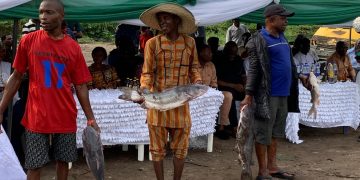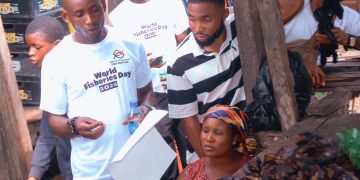In Nigeria, an estimated 37 million women and girls face period poverty, struggling to access or afford menstrual products such as pads, tampons, pain medication, and underwear. This issue remains largely neglected by society. Over the past five years, the rising cost of sanitary pads has exacerbated the problem, making these essential items even more inaccessible for many.
On World Menstrual Hygiene Day, May 28, 2024, the Prince 7 Youth Development Initiative (P7YDI), a leading non-profit organization focused on the economic development of youths across Africa, took an innovative step to end period poverty. The organization launched its ‘Pad the Girls” initiative at a secondary school in Nassarawa State, where they distributed year-long supplies of sanitary pads to 200 girls and provided education on menstrual health and the use of technology for period tracking and overall menstrual health.
The In partnership with Tech Herfrica, Child of Christ Community, and Pad Up Girls Foundation, P7YDI organized its “Pad the Girl” program in the Mararaba area of Nassarawa State, Nigeria. This event aimed to raise awareness about menstrual hygiene, empower young girls with knowledge on menstrual hygiene management (MHM), and distribute sanitary pads to young girls in the community. The program included the distribution of free menstrual pads, ensuring access to essential hygiene products, which can be a financialw burden for young girls in rural areas. Additionally, educational talks were conducted to inform participants about MHM practices, including topics on menstrual health, proper pad usage, and hygiene during menstruation.The session also covered illnesses associated with poor menstrual hygiene.
One of the most anticipated parts of the event was the distribution of sanitary pads, with each participant receiving a supply to last for several months. An interactive question-and-answer segment allowed participants to ask questions about menstrual health, with detailed and informative responses provided, helping to clarify many myths and misconceptions about menstruation.
The primary objectives of the Pad Up a Girl program were to educate young girls about menstrual hygiene and health, distribute free sanitary pads to those in need, reduce the stigma associated with menstruation, and empower girls to manage their menstrual health with dignity. The program targeted JSS 1 – SSS 2 students of Great God Academy, Mararaba, Nassarawa State.
The “Pad the Girl” program had numerous impacts, including increased awareness, with over 200 girls educated on menstrual health, helping dispel myths, and encouraging open discussions about menstruation. Out of these, 162 girls (76.78%) showed increased awareness of proper menstrual hygiene by the end of the program. There was an overall knowledge gain among the participants, with 185 girls (87.68%) demonstrating increased knowledge and skills at the end of the educational session, compared to 34 girls (16%) at the beginning of the session.
The distribution of sanitary pads will ensure that many girls do not miss school during their menstrual periods due to insufficient sanitary products, helping them maintain proper hygiene during their periods, reducing the risk of infections, and promoting overall health. Open discussions fostered by the program empowered participants with knowledge and resources to manage their menstrual health with dignity and confidence while simultaneously breaking the silence surrounding menstruation and creating a more supportive environment for girls.
The launch of the “Pad The Girls” program by P7YDI marks a significant step in addressing period poverty. This comprehensive program empowers girls with the knowledge and resources they need to manage their menstrual health and hygiene with dignity. To further amplify their impact, P7YDI is exploring partnerships with local schools and NGOs.
Speaking with the founder of Prince 7 Youth Development Initiative, Prince Godswill Edward stated that his organization plans to end period poverty for millions of girls. He called on the government and the private sector to support the initiative, adding that for Africa to achieve inclusive growth and development, girls must be equipped with the right knowledge and tools to access economic opportunities and take charge of their overall well-being.























